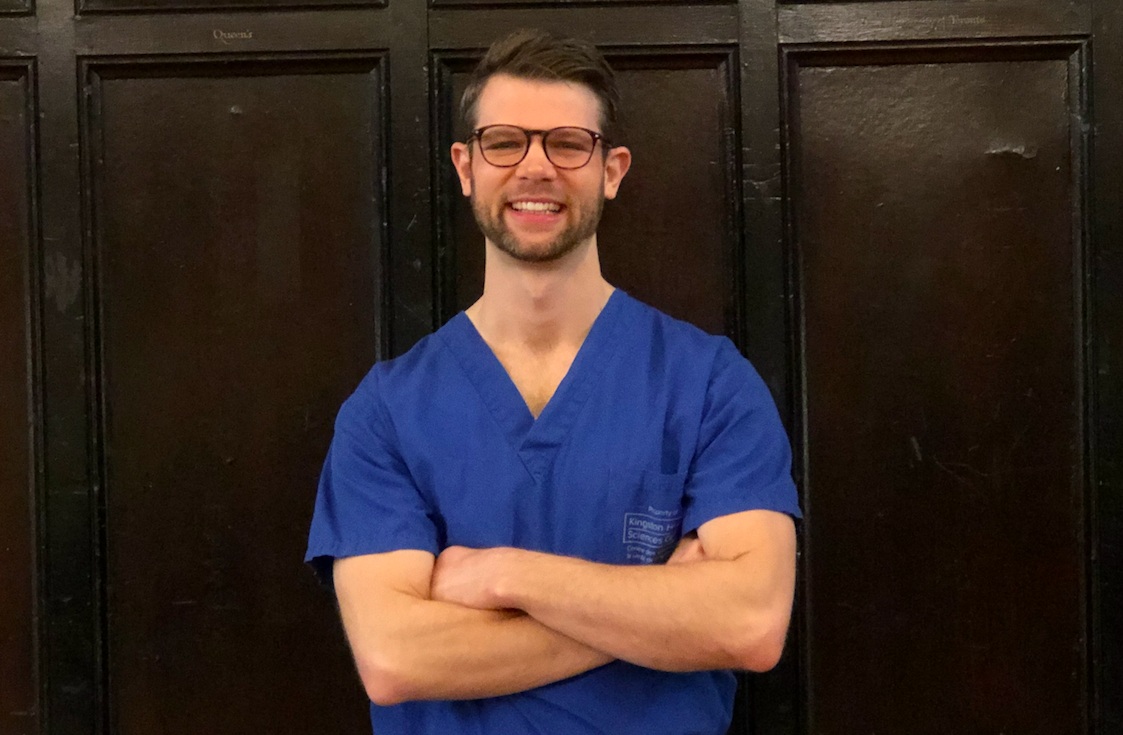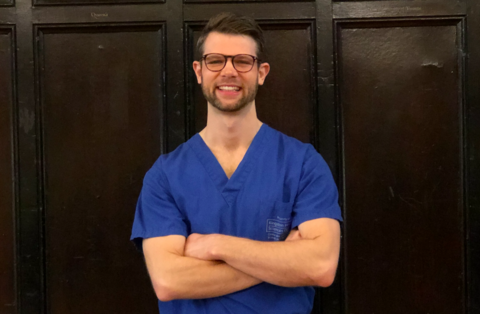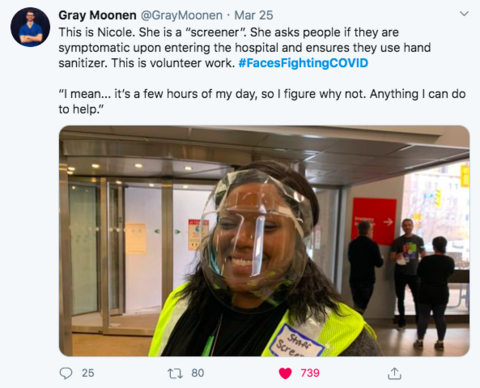Faces of U of T Medicine: Gray Moonen

Julia Soudat, Faculty of Medicine

What is your role in helping with the COVID-19 pandemic?
I’ve been on an obstetrics and gynaecology rotation so far, doing typical resident work (with added precautions due to COVID19). The workflow on obstetrics has largely remained the same - people are still delivering babies! It’s one of the few areas of medicine that maintains joy and optimism.
I’m also managing my family medicine patient roster virtually. I’m looking forward to participating in COVID-19 screening clinics in the near future and potentially joining the inpatient and/or emergency medicine teams to help out.

In an effort to keep spirits high and recognize frontline workers, I started a social media campaign to showcase people working on the frontlines under the hashtag #FacesFightingCOVID. These folks are all working in healthcare related careers at the hospital (i.e. screener, pharmacy clerk, construction worker, barista, janitorial services) but have probably not gotten the recognition that they deserve. These are some of the “unsung heroes” if you will. They are still showing up every day, even though in many cases they are worried about contracting COVID-19. I’ve found it inspiring to connect with them and share their stories with friends and the public. I think we can all use a bit of a bright spot and human connection during this time.
You also created a Facebook group for U of T residents across all specialties. Why did you decide to do this and what is the function of this group?
Residents at U of T receive guidance and support within their specialty streams, but the early stages of the pandemic made me realize that we don’t have a place to connect across programs. Many of us have the same concerns and questions during times like these, so that spurred me to create a Facebook group for U of T residents inclusive of all programs, in an effort to provide a consolidated stream of communication. It has been a platform to share our stories, promote advocacy efforts, share guidelines, wellness resources, etc.
The group has grown organically over the last week and has over 500 members now - indicating the desire for social connection and increased support in our community. Several Psychiatry residents have initiated a 'Pandemic Peer-2-Peer Support Group’, which was initially comprised of Psychiatry residents, but is now attended by residents across specialties. I’m hoping this sense of community and collegiality lasts far beyond the pandemic and can be a silver lining of community at the end of all of this.
As medicine has become more siloed and specialized over time, we are in a unique “all hands on deck” mentality currently. It’s a nice reminder that at the end of the day, we’re in the same boat and are all simply “doctors” for the time being.
How has the resident experience been impacted by this pandemic?
It has been surreal. Our Post-Graduate leadership has been forthcoming and accommodating to the changing landscape and are clearly looking out for our best interests, which has been a source or relief. They are tirelessly advocating to not extend our training time due to the changing circumstances. I am trying to reframe this as a once in a lifetime experience to be a resident.
The usual routine has been mostly upended, however we are still able to learn and grow as not only medical experts, but leaders and advocates in our community. The spotlight is on healthcare providers right now and being able to leverage that attention to promote systemic change is a unique opportunity.
I have seen both residents and staff physicians tirelessly advocating for change at the individual, community and broader societal level. We are seeing residents participate in collaborative efforts between physicians, allied health, public health, government agencies and the public to combat this pandemic. I’ve noticed many leaders step up and lean into their voices, providing calm, measured and sound advice to their patients, peer groups, junior learners, family and friends. Residents are stepping up and covering call shifts for ill or quarantined colleagues, offering to work COVID-19 clinics or be redeployed to a higher need service. I genuinely believe we will all become better physicians and community members as a result of this. I just hope there is not too much suffering in the interim.
What have been the biggest challenges so far?
I’ve been very lucky to be at the University Health Network, where leadership has shown calm, thoughtful and measured communication throughout this crisis.
On a personal level, my challenges are related to a feeling of a lack of control and immense empathy for the suffering that will occur. Viral pandemics are dynamic and uncertain in nature, and the stress of constantly evolving information and guidelines have caused a loss of sense of control. That being said, we are learning more and are growing more confident every day, especially with Canadians staying home to flatten the curve.
I’m worried about patients, my family, friends and all those who are vulnerable. There are also the second and third order effects of this - both acute and chronic issues not being managed, diagnostic imaging, screening tests and follow up blood work not being done.
I worry about social distancing developing into social isolation, which can be particularly challenging for the elderly, who in our society are more likely to be isolated, or people with mental health conditions. I worry about the disproportionate economic burden this will have on people in the populations that are already most vulnerable.
Any lessons or positives that emerged in light of this pandemic?
We’re in the thick of it right now, but there is hope and light in these dark times. I am optimistic and hopeful.
The community is showing levels of camaraderie and support that I have never witnessed. Volunteers are stepping up, everyone is still showing up to work with resolve, compassion, kindness and professionalism that has been inspiring. It’s easy to get overwhelmed with anxiety and panic, but there are helpers everywhere.
I’ve also been impressed with the scrappiness and innovation Canadians have been showing. We are finding ways of producing PPE through 3D printers, ramping up blood donations, volunteering for hospital positions. Small businesses are providing free food for healthcare workers despite feeling a significant economic crunch. The strength and courage of patients that are staying home despite feeling quite ill.
Personally, my gratitude for my work, my support system and my community has grown multi-fold. This is a beautiful silver lining.
What would you want people to know about this pandemic? What do you think is important to emphasize?
I am by no means an expert in any of this and rely on the guidance of resources and experts who are much smarter than me, such as Public Health Toronto, the Government of Canada and physicians like Isaac Bogoch, Jane Philpott and Theresa Tam.
That being said, if the constant deluge of information is causing anxiety, then it’s probably smart to block one or two times during the day to check the news and then ignore it for the rest of the day. I would encourage everyone to do their best to stay mentally and physically well in ways that are important, realistic and sustainable for them given the constraints. For every meeting, date or social gathering you are going to miss, send two, three or four texts or FaceTime calls to stay connected.
News



